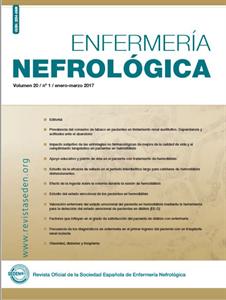Contenido del artículo principal
Resumen
Introducción: Los pacientes que padecen enfermedad renal crónica avanzada sufren diversos cambios en sus vidas, a causa de la propia enfermedad y el tratamiento, que provocan trastornos ansioso-depresivos y alteraciones en el estado emocional.
Objetivo: El objetivo del presente estudio fue evaluar el estado emocional de los pacientes en hemodiálisis e identificar las necesidades de apoyo emocional.
Pacientes y Método: Se estudiaron 66 pacientes, un 68.2% hombres y la media de edad fue de 65.5±16.25 años. Se ha realizado un estudio observacional descriptivo de corte transversal, en la Unidad de Gestión Clínica (UGC) de Nefrología del Hospital Universitario Reina Sofía (HURS) de Córdoba. Las variables demográficas añadidas en el estudio han sido: edad, sexo, estado civil, otras patologías asociadas, nivel económico y ocupación. La variable resultado fue el estado emocional, medida con la Herramienta para la Detección del Estado Emocional de Pacientes en Diálisis EE-D.
Resultados: Del total de pacientes un 86.3 % estaban jubilados y la media de los ingresos económicos mensuales era de 878.79±533.35 €. Más del 42% presentaban al menos 2 o más patologías asociadas a su enfermedad de base y el 62.1% estaba casado. Respecto a las variables tristeza y nerviosismo un 54.5% se encontraba triste, y el 59.1% estaba nervioso. Por otro lado, un 92.4% tenía alterado en mayor o menor medida el estado emocional.
Conclusiones: Existe una alta prevalencia de alteración del estado emocional en los pacientes estudiados y un elevado número de ellos necesitan apoyo emocional.
Objetivo: El objetivo del presente estudio fue evaluar el estado emocional de los pacientes en hemodiálisis e identificar las necesidades de apoyo emocional.
Pacientes y Método: Se estudiaron 66 pacientes, un 68.2% hombres y la media de edad fue de 65.5±16.25 años. Se ha realizado un estudio observacional descriptivo de corte transversal, en la Unidad de Gestión Clínica (UGC) de Nefrología del Hospital Universitario Reina Sofía (HURS) de Córdoba. Las variables demográficas añadidas en el estudio han sido: edad, sexo, estado civil, otras patologías asociadas, nivel económico y ocupación. La variable resultado fue el estado emocional, medida con la Herramienta para la Detección del Estado Emocional de Pacientes en Diálisis EE-D.
Resultados: Del total de pacientes un 86.3 % estaban jubilados y la media de los ingresos económicos mensuales era de 878.79±533.35 €. Más del 42% presentaban al menos 2 o más patologías asociadas a su enfermedad de base y el 62.1% estaba casado. Respecto a las variables tristeza y nerviosismo un 54.5% se encontraba triste, y el 59.1% estaba nervioso. Por otro lado, un 92.4% tenía alterado en mayor o menor medida el estado emocional.
Conclusiones: Existe una alta prevalencia de alteración del estado emocional en los pacientes estudiados y un elevado número de ellos necesitan apoyo emocional.
Palabras clave
ESTADO EMOCIONAL
HEMODIÁLISIS
TRISTEZA
NERVIOSISMO
EE-D
APOYO EMOCIONAL
Detalles del artículo
Licencia
Aviso de derechos de autor/a
© Los autores ceden de forma no exclusiva los derechos de explotación de los trabajos publicados y consiente en que su uso y distribución se realice con la Licencia Creative Commons Atribución - No comercial 4.0 Internacional (CC BY-NC 4.0). Puede consultar desde aquí la versión informativa y el texto legal de la licencia. Esta circunstancia ha de hacerse constar expresamente de esta forma cuando sea necesario.
Cómo citar
1.
Moya Ruiz MA. Estudio del estado emocional de los pacientes en hemodiálisis. Enferm Nefrol [Internet]. 2017 [consultado 8 Nov 2025];20(1):[aprox. 9 p.]. Disponible en: https://www.enfermerianefrologica.com/revista/article/view/4048




